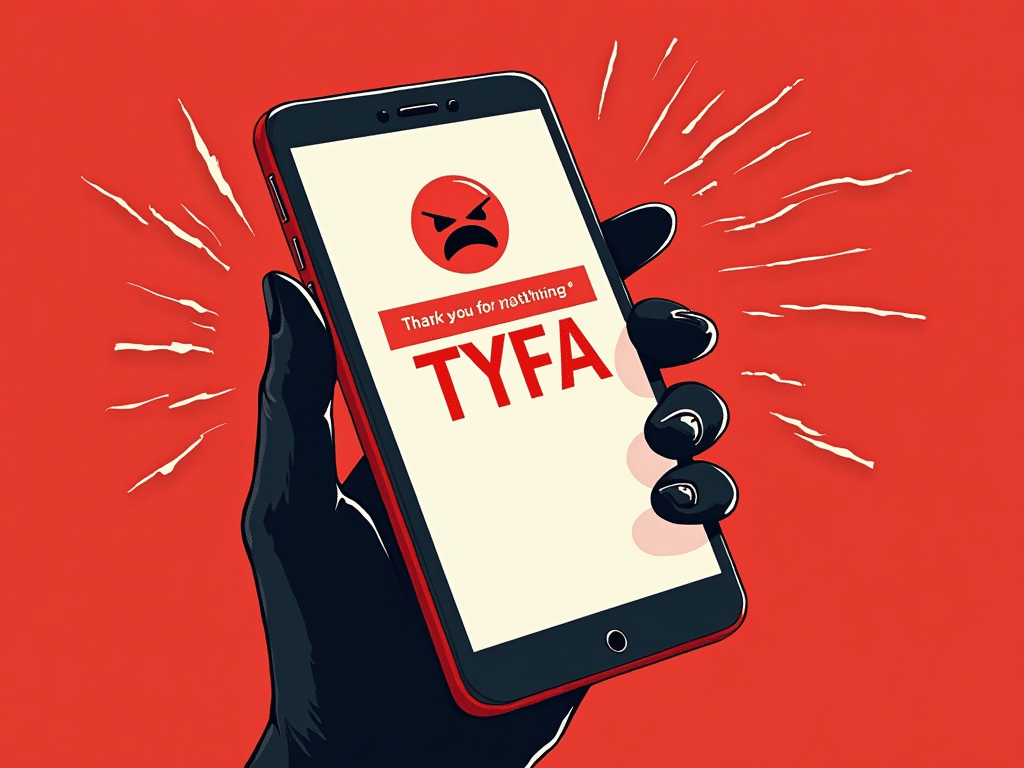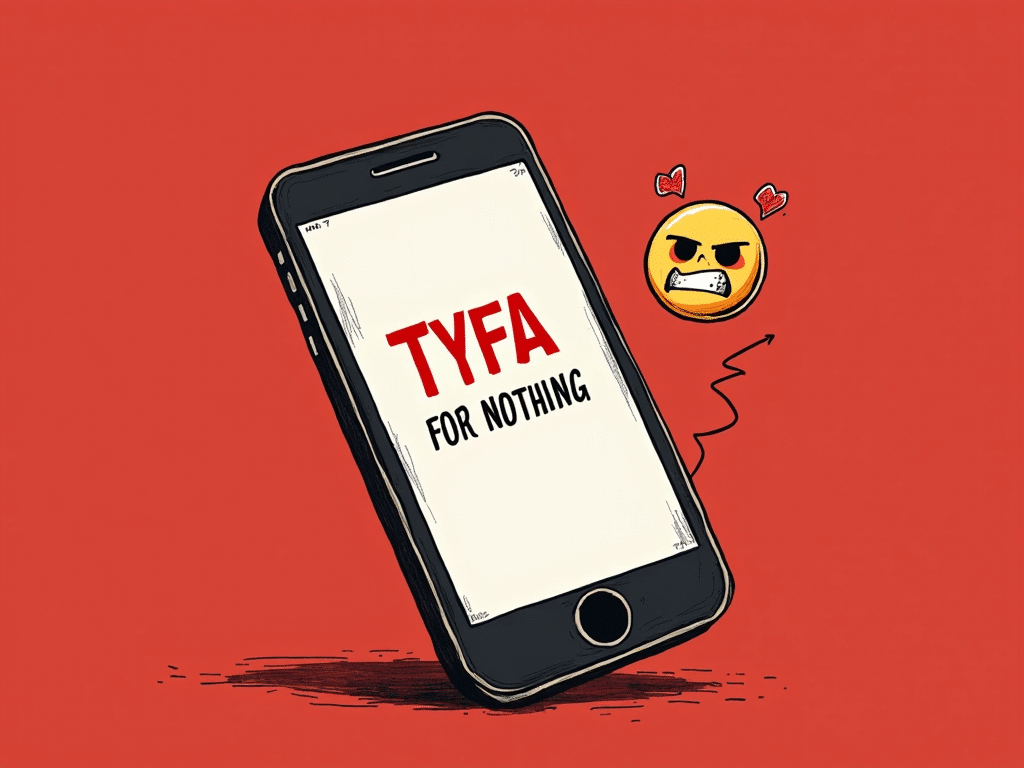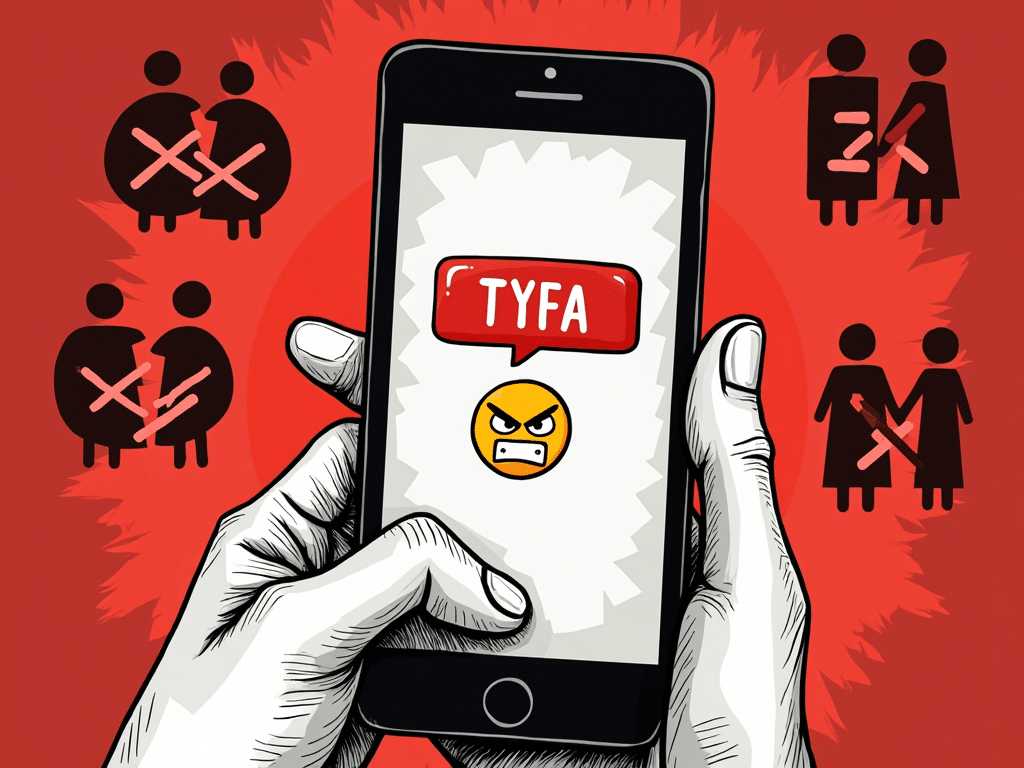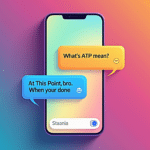Hey there, slang enthusiasts! Ever stumbled upon TYFA in a text and scratched your head wondering what it means? Well, you’re in for a treat because we’re about to dive deep into this nifty little acronym that’s been popping up all over the digital world. TYFA is more than just four random letters – it’s a way to show appreciation and acknowledge someone’s interest all at once. Pretty cool, right?
| Key Takeaways |
|---|
| TYFA stands for “Thank You For Asking“ |
| It’s commonly used in texting and social media |
| Shows appreciation for someone’s concern or interest |
| Can be used sincerely or sarcastically |
| Part of the growing trend of gratitude expressions in digital communication |

TYFA Meaning
TYFA Meaning: Alright, let’s break it down. TYFA stands for “Thank You For Asking.” It’s like giving a virtual high-five to someone for showing interest in your life or well-being. When someone uses TYFA, they’re basically saying, “Hey, I appreciate that you cared enough to ask about me or my situation.”
TYFA Meaning in Text: In the world of texting and social media, TYFA is your go-to when you want to acknowledge someone’s question and show gratitude at the same time. Here’s how you might see it used:
- Friend: “How’s your new job going?”
You: “It’s challenging but exciting! TYFA 😊” - Classmate: “I heard you were sick. Feeling better?”
You: “Much better now, TYFA!”
It’s a quick way to show you’re touched by someone’s concern without having to type out a long response. Plus, it adds a nice, friendly touch to your digital convos.
Also read: IGHT Meaning
The Evolution of TYFA: From Gratitude to Sass
Now, you might be wondering, “Where did this TYFA thing come from?” Well, buckle up, ’cause we’re taking a quick trip down memory lane!
TYFA started as a straightforward way to express thanks for someone’s interest. But like many things on the internet, it’s evolved. These days, TYFA can wear a few different hats:
- Sincere Gratitude: The original and most common use. You’re genuinely thankful someone asked about you.
- Polite Acknowledgment: When you want to be nice but maybe don’t want to get into details.
- Sarcastic Response: Yep, sometimes TYFA can have a bit of an edge. Like when someone asks a nosy question and you’re not thrilled about it.
It’s all about context, folks. The tone of the conversation can turn TYFA from super sweet to slightly salty in no time flat.
When to Use TYFA: A Quick Guide

Okay, so now you know what TYFA means, but when should you use it? Here’s a handy list to help you out:
- When someone asks about your health or well-being
- After being asked about a significant event in your life
- When acknowledging a thoughtful question
- To politely deflect a question you don’t want to answer in detail
- In response to a friend checking in on you
Remember, TYFA is all about striking that balance between appreciation and brevity. It’s perfect for those situations where you want to acknowledge someone’s interest without diving into a long explanation.
TYFA vs. Other Thank You Slang: The Gratitude Showdown
TYFA isn’t the only player in the thank-you game. Let’s see how it stacks up against some other popular gratitude slang:
| Slang | Meaning | Usage |
|---|---|---|
| TYFA | Thank You For Asking | Acknowledges the question itself |
| TYM | Thank You Much | General gratitude |
| TYVM | Thank You Very Much | More emphatic thanks |
| TY | Thank You | Basic, quick thanks |
As you can see, TYFA has its own special place in the world of digital gratitude. It’s not just about saying thanks, but specifically acknowledging the act of asking.
The TYFA Tone: It’s All in How You Say It
Here’s where things get interesting. TYFA can change its tune depending on how it’s used. Let’s break it down:
- Genuine TYFA: When you’re truly grateful someone asked. It’s like a warm digital hug.
Example: “I’ve been going through a tough time, but I’m feeling better now. TYFA for checking in!” - Polite TYFA: When you want to acknowledge the question without getting into details.
Example: “It’s complicated. TYFA, though!” - Sarcastic TYFA: When the question is a bit nosy or unwelcome.
Example: “Yes, I’m still single. TYFA for the reminder. 🙄”
The key is to pay attention to the context and any emojis or punctuation that might give you clues about the tone. It’s like being a digital detective!
Also read: WTD Meaning
TYFA in Different Contexts: Not Just for Texts
While TYFA was born in the world of texting, it’s spread its wings and flown into other areas of digital communication. Let’s take a tour:
- Social Media: You might see TYFA in comments or replies, especially on platforms like Twitter or Instagram where space is at a premium.
- Online Forums: In discussion threads, TYFA can be a quick way to acknowledge someone’s interest in your post or question.
- Email: Yep, TYFA has even made its way into more formal communication channels (though use with caution in professional settings).
- Online Gaming: Gamers might use TYFA to quickly thank teammates for checking on their status or asking about their strategy.
Remember, context is key. What works in a text to your bestie might not fly in an email to your boss. Use your TYFA powers wisely!
The Psychology of TYFA: Why We Love Quick Thanks
Ever wonder why we’re so drawn to acronyms like TYFA? Well, it’s not just about saving time (though let’s be honest, that’s part of it). There’s actually some cool psychology behind our love for quick thank-yous:
- Efficiency: In our fast-paced digital world, TYFA lets us express gratitude without slowing down our conversations.
- Emotional Expression: It’s a way to show feelings quickly in a medium (texting) that can sometimes feel emotionally flat.
- Social Bonding: Using TYFA acknowledges the other person’s interest, strengthening social connections.
- Politeness: It’s a quick way to maintain social niceties without getting too deep into a topic.
So next time you type out TYFA, know that you’re not just saving keystrokes – you’re engaging in a complex social dance. Pretty deep for four little letters, right?
Also read: GTK
The Do’s and Don’ts of TYFA
Alright, let’s get down to brass tacks. Here’s a quick guide to using TYFA like a pro:
Do’s:
- Use it when genuinely appreciating someone’s concern
- Pair it with emojis for extra expression (TYFA 😊)
- Use it to politely acknowledge questions you don’t want to answer in detail
Don’ts:
- Don’t use it in formal or professional settings
- Avoid using it sarcastically unless you’re sure the other person will get it
- Don’t overuse it – variety is the spice of life!
TYFA Alternatives: Mixing Up Your Gratitude Game
Sometimes you want to switch things up a bit. Here are some alternatives to TYFA that still keep things casual:
- “Thanks for checking in!”
- “Appreciate you asking!”
- “Glad you asked!”
- “Thanks for your concern!”
- “That’s thoughtful of you to ask!”
These alternatives can help you avoid sounding repetitive, especially if you find yourself saying thanks a lot. After all, you don’t want to end up sounding like a broken record – or worse, a bot!
TYFA Around the World: A Global Phenomenon
One of the coolest things about internet slang is how it crosses borders. TYFA is no exception! While it originated in English-speaking countries, it’s now used by people all over the world who speak English as a second language.
It’s like a little digital high-five that works in any language. Whether you’re chatting with your LOML from across the ocean or thanking a finfluencer for asking about your investment strategy, TYFA is a universal way to show appreciation for someone’s interest.
The Future of TYFA: Will It Stand the Test of Time?
So, what’s next for our friend TYFA? Will it stick around, or go the way of “groovy” and “rad”? Here’s what we think:
- Staying Power: TYFA fills a specific niche in digital communication, which suggests it might have some staying power.
- Evolution: We might see variations pop up, like TYFAA (Thank You For Actually Asking) for extra emphasis on sincerity.
- Integration: As AI and chatbots become more prevalent, TYFA might become a way to distinguish human interaction from automated responses.
Only time will tell, but for now, TYFA seems to be holding strong in the ever-changing world of internet slang.
Conclusion: TYFA – Small Letters, Big Impact
And there you have it, folks – the full scoop on TYFA. From its origins as a simple thank-you to its current status as a multi-faceted expression of gratitude and acknowledgment, TYFA has come a long way. It’s more than just a quick way to say thanks; it’s a little piece of internet culture that helps us connect and show appreciation in our fast-paced digital world.
Whether you’re a long-time TYFA user or you’re just adding it to your digital vocabulary, remember that at its heart, TYFA is all about acknowledging others and showing gratitude. In a world that can sometimes feel a bit cold and impersonal, taking the time to say “thank you for asking” – even in its shortest form – can make a big difference.
So go forth and spread some gratitude! Whether you’re thanking your friend for checking in on your day or acknowledging someone who asked about your latest crypto adventure, TYFA has got your back.
And hey, thanks for sticking with me through this deep dive into the world of TYFA. You’re awesome for taking the time to learn about this cool little acronym. TYFA for reading! 😉👍
Remember, in the grand scheme of things, a little gratitude goes a long way. So keep on TYFAing, and watch how it brightens up your digital conversations!







